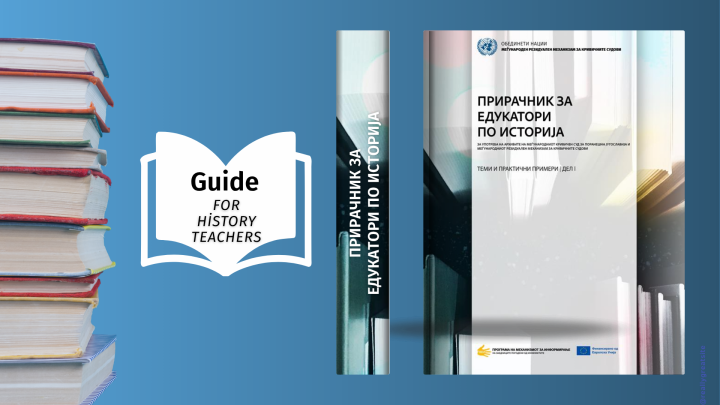MIP Publishes Macedonian Translation of the Guide for History Teachers
The Mechanism Information Programme for Affected Communities (MIP) has today released the complete Macedonian translation of the Guide for History Teachers: How to Use Archival Material of the ICTY and Mechanism in Teaching the History of the 1990s Conflicts. This new translation makes this valuable resource more accessible to history educators working in the Macedonian language, further broadening its impact across the region.
The guide, developed in collaboration with the European Association of History Teachers (EuroClio) and representatives from history teachers’ associations across the former Yugoslavia, is designed to support educators in effectively integrating archival material from the International Criminal Tribunal for the former Yugoslavia (ICTY) and the International Residual Mechanism for Criminal Tribunals (Mechanism) into their lessons.
By utilizing judicially established facts and witness testimonies, teachers can create engaging, fact-based, and balanced lessons about the conflicts of the 1990s.
The guide consists of three volumes. The first volume introduces the framework and guidance for using ICTY and Mechanism archives in history education and offers guidance to educators on how to approach sources. The second volume presents a set of lesson plans on topics such as the ICTY’s work legacy, children and women in war, destruction of cultural heritage, and migrations. The third volume explores themes like incitement to war crimes, unlawful detention, sexual violence, the role of soldiers in war, and daily life during war. Together, these volumes form a comprehensive guide to support educators in teaching these difficult topics.
All three volumes are now available in Bosnian/Croatian/Serbian (BCS) and Macedonian languages.
Funded by the European Union, the MIP aims to enhance knowledge and understanding among citizens and communities in the countries of the former Yugoslavia regarding the crimes committed during the 1990s conflicts, based on ICTY and Mechanism cases.

The Mechanism Information Programme for Affected Communities (MIP) has today released the complete Macedonian translation of the Guide for History Teachers: How to Use Archival Material of the ICTY and Mechanism in Teaching the History of the 1990s Conflicts. This new translation makes this valuable resource more accessible to history educators working in the Macedonian language, further broadening its impact across the region.
The guide, developed in collaboration with the European Association of History Teachers (EuroClio) and representatives from history teachers’ associations across the former Yugoslavia, is designed to support educators in effectively integrating archival material from the International Criminal Tribunal for the former Yugoslavia (ICTY) and the International Residual Mechanism for Criminal Tribunals (Mechanism) into their lessons.
By utilizing judicially established facts and witness testimonies, teachers can create engaging, fact-based, and balanced lessons about the conflicts of the 1990s.
The guide consists of three volumes. The first volume introduces the framework and guidance for using ICTY and Mechanism archives in history education and offers guidance to educators on how to approach sources. The second volume presents a set of lesson plans on topics such as the ICTY’s work legacy, children and women in war, destruction of cultural heritage, and migrations. The third volume explores themes like incitement to war crimes, unlawful detention, sexual violence, the role of soldiers in war, and daily life during war. Together, these volumes form a comprehensive guide to support educators in teaching these difficult topics.
All three volumes are now available in Bosnian/Croatian/Serbian (BCS) and Macedonian languages.
Funded by the European Union, the MIP aims to enhance knowledge and understanding among citizens and communities in the countries of the former Yugoslavia regarding the crimes committed during the 1990s conflicts, based on ICTY and Mechanism cases.